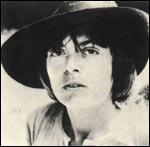In Memoriam: Monique Wittig
Julia Balén
 On January 3rd, 2003, we lost a dear friend and colleague, and the world lost one of its greatest writers and thinkers, Monique Wittig. She went for a walk in her beloved Sabino Canyon on that sunny winter day. I can hear her talking with the birds, rabbits, and lizards as they stopped to consider her French. We had taken many such walks together over the twelve years since she had first come to Tucson, shared many dinners and conversations long into the night. She had become my dearest friend. Strangely, the morning of the day she died, my partner and I went out to find "lesbos" scrawled across the camper shell of our truck. In retrospect it seemed an odd omen.
On January 3rd, 2003, we lost a dear friend and colleague, and the world lost one of its greatest writers and thinkers, Monique Wittig. She went for a walk in her beloved Sabino Canyon on that sunny winter day. I can hear her talking with the birds, rabbits, and lizards as they stopped to consider her French. We had taken many such walks together over the twelve years since she had first come to Tucson, shared many dinners and conversations long into the night. She had become my dearest friend. Strangely, the morning of the day she died, my partner and I went out to find "lesbos" scrawled across the camper shell of our truck. In retrospect it seemed an odd omen.
Amazingly few people in our relatively quiet valley knew that one of the 20th century’s most innovative writers had lived in Tucson since 1990, or that she taught at the University of Arizona in Women’s Studies; Lesbian, Gay, Bisexual, Transgender Studies; French and Creative Writing. This suited her desire for solitude. Many who did know were too awed by her work to take her classes or to get to know her. As department adviser, I often had to urge intimidated students to take her classes—daring them to work with her. Those who did become her students often took every class they could with her thereafter and have described working with her as a life-changing experience. Even faculty members have admitted being awed and unable to bring themselves to reach out to her. For those of us who invited her into our lives, there was no better friend in the world.
Wittig will be remembered throughout the world for, among other things, being a winner of the prix Médicis, France’s most prestigious prize for writers, for her first novel, L¹Opoponax. The New York Times Book Review wrote, "In both form and content The Opoponax is a revolutionary story." One of its most revolutionary aspects is her use of pronouns, a project she developed throughout her oeuvre. Resisting language’s insistent generalization of the masculine and particularization of the feminine, Wittig brilliantly and effectively used the non-gendered pronoun "one" to articulate lesbian childhood experiences as the general. This allowed her to, in her own words, "locate the characters outside of the social division by sexes and annul it for the duration of the book. Claude Simon expressed evidence of her success when he wrote in his 1964 review of the book, "I see, I breathe, I chew, I feel through her eyes, her mouth, her hands, her skin." He, in effect, became lesbian—for the moment, neither man nor woman. All of her fiction continued this project of resisting what she came to call "the mark of gender."
The materialist revitalization of language, particularly pronouns, so central to her works makes translation difficult, if not impossible. Unfortunately she had no say in how her novels were translated and, while she was generally pleased with the quality of the English translations, the pronouns remain a serious problem in two novels in particular. In The Opoponax the translator used “you” instead of “one” even though, as she has noted, the use of “one” in English is no heavier than in French; and in Les Guérillères the feminine plural “elle” is most often translated as “the women” rather than “they”—both of which offer a different valence than the feminine plural “elle.” In spite of these problems, her poetic play with language still produces an effective universalization of lesbian subjectivity. In The Straight Mind and Other Essays, the one book she published first in English, she explains the theory behind her writing practice. She describes the battle that she felt Djuna Barnes’ work effectively wages and, in doing so, describes her own work:
[The lesbian] poet generally has a hard battle to wage, for, step by step, word by word, she must create her own context in a world in which, as soon as she appears, bends every effort to make her disappear. The battle is hard because she must wage it on two fronts: on the formal level with the questions being debated at the moment in literary history, and on the conceptual level against the that-goes-without-saying of the straight mind.
There was nothing that could go without saying to Monique Wittig’s mind; nothing left unquestioned or unchallenged. This did not make her life easy, but her refusal to accept anything that-goes-without-saying made her thinking radically unique and challenging. Wittig took Simone de Beauvoir’s claim that "one is not born a woman" a step further, via Marx, to claim that lesbians are not women because they do not participate in the gender/class system of male/female. She fought not for recognition of minority status but to render dichotomies like male/female or majority/minority meaningless.
Monique Wittig’s work is taught throughout women’s studies, LGBT and queer studies, and French literature. She remains a leading force in feminist and queer theory throughout the world, with contemporary work relying on her brilliant resistance to heteronormativity. It is important to note that she had serious disagreements with queer theory, particularly the ways in which some prominent scholars have misread and misused her work to articulate concepts of power with which she did not agree.
As writers and scholars go, she certainly had reason to be elitist: her substantial oeuvre has been translated into at least 12 languages; she produced a play, The Constant Journey, and her story, “The Girl,” was produced in film by her partner, Sande Zeig. Nevertheless, she lived what she believed at every level of her life, preferring reasoned argument over power plays and remaining staunchly anti-elitist, even within institutional frameworks like the University of Arizona.
Wittig will also be remembered as a co-founder of the feminist movement in France, and of some famous groups such as Les Féministes Révolutionnaires and Les Gouines Rouges (the Red Dykes). She caused a great stir in Paris when she and several comrades placed a wreath at the Arc de Triomphe with a banner that read: “There is someone more unknown than the unknown soldier--his wife.” Many of us will remember always the delicacy and strength with which she challenged us to better thinking and writing, her willingness to listen with an open and intelligent heart, her love for simple but elegant food, and her ferocious attentiveness to language and its material effects.
She had many plans: a script for another film with her partner, Sande Zeig; an article for English speakers about her latest publication, Paris-la-politique that she and I had been developing over the year and, no doubt, spending time in Sabino Canyon. While we mourn a life lost too early, the rich projects unfinished, we are grateful to have such a peerless body of work by which to remember her.
First published in The Women’s Review of Books, January 2004, Vol. XXI, No. 4.
Remembering Wittig
Je n’ai pas trouvé de morale à ma fable mais seulement comme en filigranele tracé d'un principe qui les résume tous et qui est: ni dieux ni déesses, ni maîtres ni maîtresses.
Monique Wittig, Paris-la-politique(I have not found a moral to my fable but only, like a watermark, the trace of a principle which summarizes all and that is: neither gods nor goddesses, neither masters nor mistresses. Translation by Julia Balén)
One says that Monique Wittig’s slender fingers dark eyes teeth heart shining knees are all ashes and dust. That all are laid to rest. One is silent. One packs champagne cheese tomatoes oil basil bread to the canyon where Wittig walked to hear the eight beat call of the cactus wrens playing among saguaros watches the light against rock walls for just the right shade of yellow pink orange purple kicks sand onto rocks onto sand. One’s boot is dusty.
They lay flowers and weep and re-member her texts in the piecemeal order of their aching thoughts. They say Wittig changed our lives changed the meaning the way things could mean that lesbians are not women. Wittig teaches us to make language new make it carry new meaning so that words work like a Trojan horse and gender is impossible. They say we will consume the words to make Wittig our own to remember Wittig. They will laugh at their own circles and leave balloons, emptied of their hot air, to the wind and dust.
You are gone to m/e. The only body I can retrieve from the bowels of death is the texts you have left behind. The only kisses and embraces words. I take each word in m/y mouth to roll round m/y tongue between m/y teeth and cheeks and chew. Each bite is bitter and I cannot get enough. I search for answers to m/y grief and find only deeper longing at this taste of your presence. The echo of your voice reverberating with words your words in m/y head, m/y heart, m/y hands.
One they we you I will suffer no windbags no gods or goddesses in your memory.
First published in Frontiers: A Journal of Women’s Studies, vol 6:2, 2005, 1-2.
about the author
Julia Balén has a Ph.D. in Comparative Cultural and Literary Studies with a focus on issues of embodiment and power relations and has published numerous articles on topics ranging from feminist humor to activism and pedagogy. She is currently finishing a book, "Roberta’s Rules," on feminist decision-making practices and has two new projects in various stages of development: a collection of essays on the central project of Monique Wittig's work, Annulling Gender, and a study of the LGBT choral movement.

